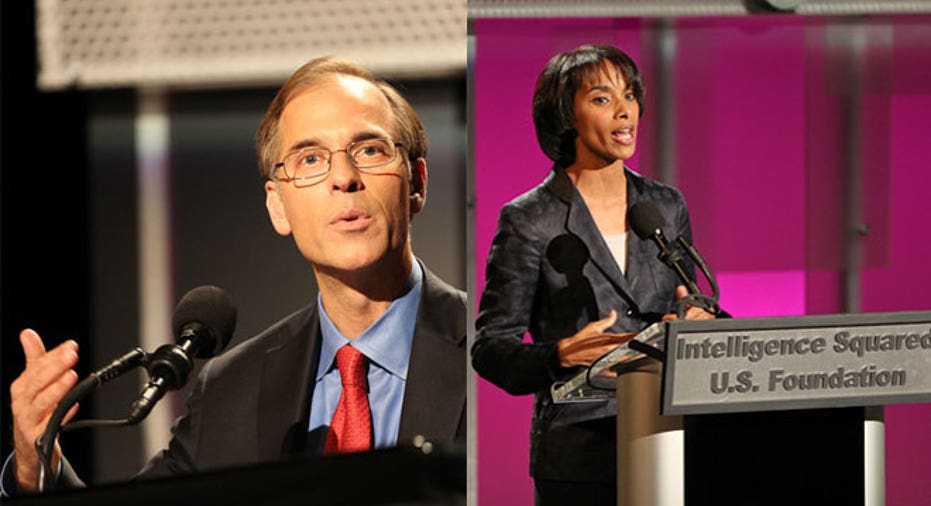Too Late to Debate Obama Stimulus Plan

There was really no point to any further debate, but I went to the debate, anyway.
It was part of the Intelligence Squared U.S. Debate Series at New York University's Skirball Center on Tuesday night. The topic: "Congress Should Pass Obama's Jobs Plan--Piece By Piece."
It was fun watching four wonkish brainiacs flagellate each other over a $447 billion stimulus plan that was pretty much dead on arrival weeks ag.
Speaking in favor of President Barack Obama's plan were Mark Zandi, chief economist of Moody's Analytics, and Cecilia Rouse, a Princeton University economics professor who served on Obama's economics council.
Speaking against it were Richard Epstein, NYU law school professor, and Daniel Mitchell from the Cato Institute.
Here's what they said:
Zandi: "We need to avoid going back into a recession. If policy makers do nothing, the odds of recession are very serious."
Mitchell: "Japan has had by some accounts 16 different stimulus packages since their economy entered the doldrums in the 1990s. Those haven't worked. Bush had a stimulus package in 2008. It didn't work. And then, of course, Obama has done the same thing. Time after time, we don't seem to be getting very good results."
Rouse: "I'm very worried about how families are getting by. We have 46 million families living in poverty. I'm worried that our recovery is very fragile."
Epstein: "There is no disagreement over the sad state of the American economy and the need for something to be done. The question is what should be done. Any kind of short-term fix is doomed to failure."
Zandi: "Fiscal stimulus is a tried-and-true policy response to recessions. In every recession since World War II, we've had fiscal stimulus. In fact, the degree of fiscal stimulus provided is commensurate with the severity of the recession. One could argue that the fiscal stimulus that was provided in this recession was inadequate. That's one of the reasons why the economy hasn't engaged to the degree most would have thought at this point."
Epstein: "We've seen the results already. At the time the Obama Administration introduced its first stimulus, there was a confident prediction; that it would lower unemployment to under 8%. Nothing of the sort happened."
Rouse: "They generated that estimate based on what they knew at the time. As it turned out, the economy was a lot sicker than what they even knew."
Mitchell: "This is the .. argument: That no matter how much things fail, we just should have spent more money. But this is what gets you to eventually becoming Greece."
Zandi: "The fiscal stimulus has been effective. The purpose is not to provide a source of long-term economic growth. It's about ending the recession. It succeeded in ending the Great Recession in just a few days."
Epstein: "The problem is where the money is going to come from. If you raise [taxes] on the most productive individuals in society you're taking money from the hands of people who know how to use it and putting it into the hands of the government which simply doesn't know.
Rouse: "There's not a correlation between the highest marginal tax rates and economic growth. Reagan lowered tax rates for higher-income individuals. Clinton increased them. And you actually saw greater economic growth under Clinton than Reagan."
Mitchell: "The Hippocratic Oath about 'do no harm' I think really applies. We should consider why we get recessions in the first place, which in many cases is because of government policy mistakes."
Zandi: "We have come a long way. Our economy has righted a lot of the wrongs that got us to this point. We're really very close. We just cannot go back into a recession in the near future. .. The collective psyche is already on edge. You're nervous. I'm nervous. We're all very frazzled. A recession will just tip us over."
Epstein: "One of the truly misguided features of the stimulus is the American Recovery Reinvestment Act. It's a massive bureaucracy, which is designed to ensure that the money will largely be wasted. It is a bill designed to make sure that the president's supporters, strong union members, get jobs, which will allow them to contribute to the campaign to win."
Rouse: "If workers and their families are not supported, they're just going to end up on other government programs."
And so it went: If we don't have another stimulus, we're on the highway to hell. And if we do, we're on yet another stretch of the same damned highway. Here's how the audience voted at the end of the debate: 69% for, 22% against, and 9% undecided as to how they want to burn.
(Al's Emporium, written by Dow Jones Newswires columnist Al Lewis, offers commentary and analysis on a wide range of business subjects through an unconventional perspective. Contact Al at al.lewis@dowjones.com or tellittoal.com)



















